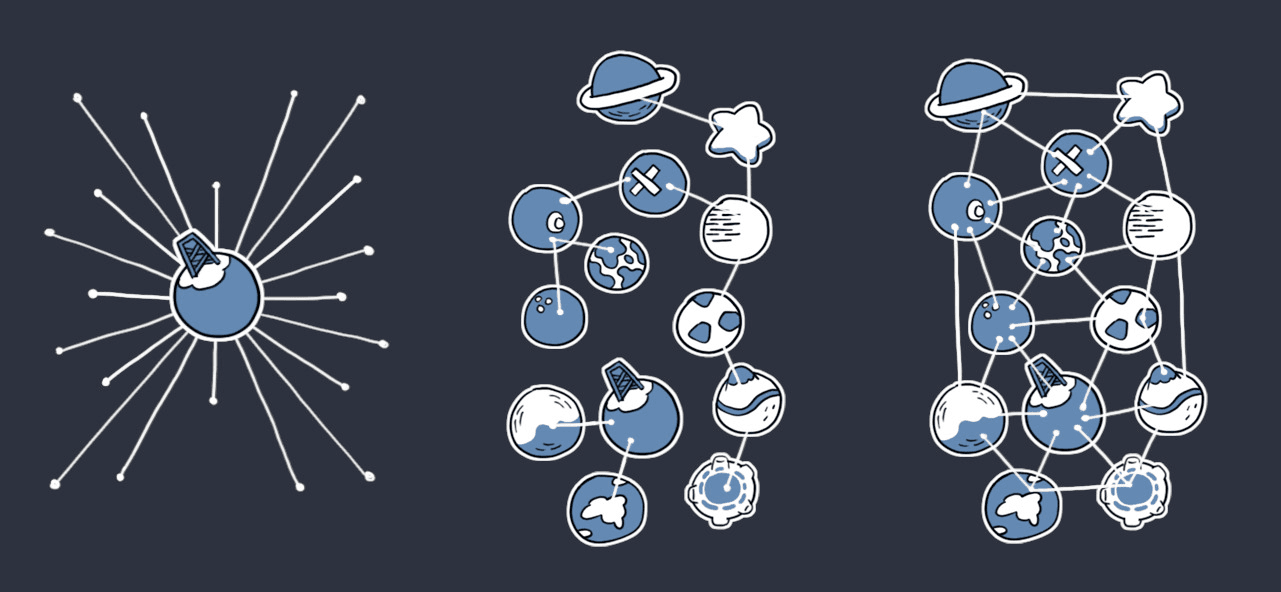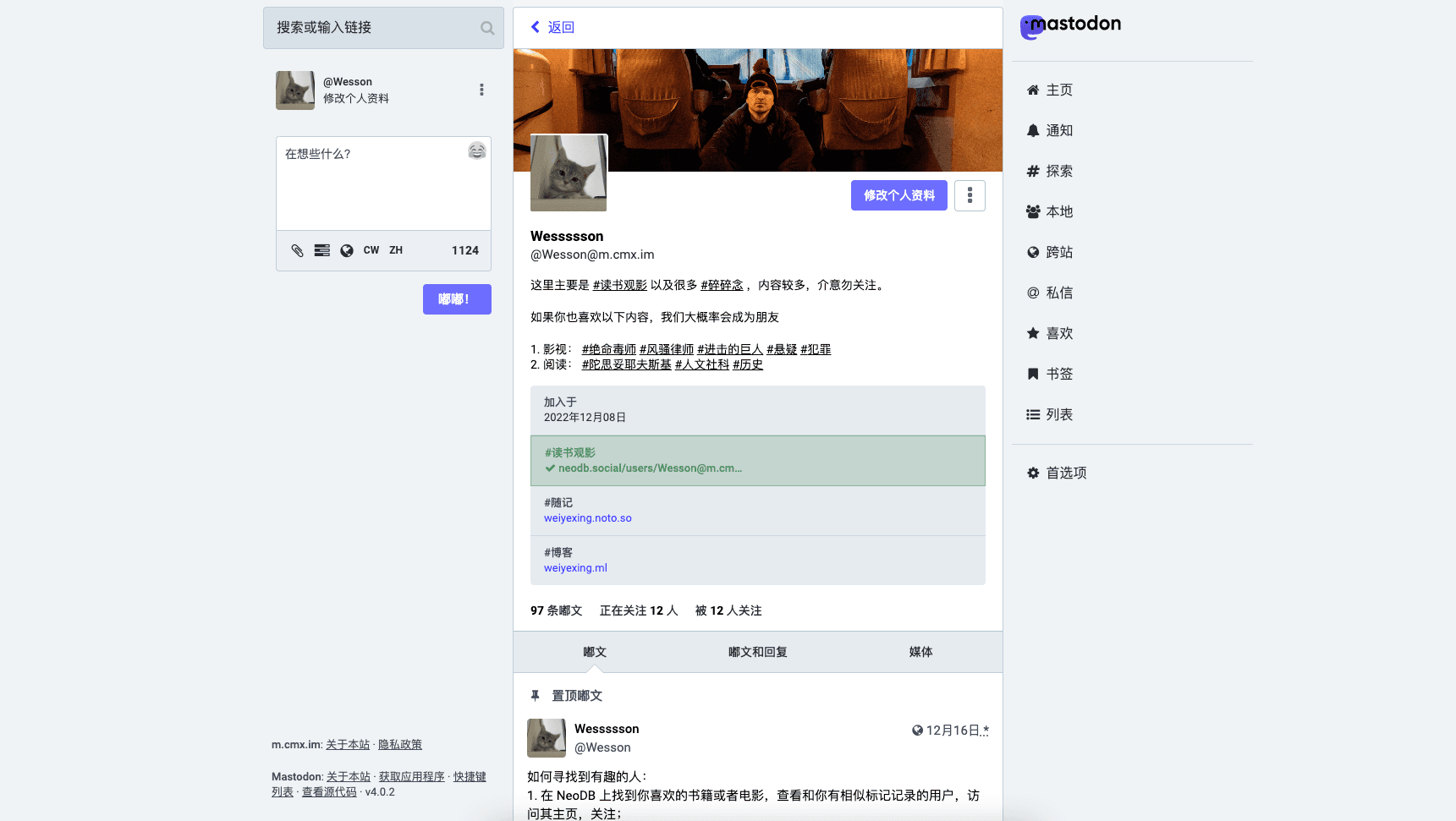近期比较深入地体验了一款叫「长毛象」的产品,关于名字,其实还闹了个乌龙,人家原本叫 Mastodon(乳齿象)的,最初翻译成了长毛象,发现错译时已经传开了,且这个译名很可爱,就继续沿用了。
简介#
长毛象是一个类似微博、Twitter 的社交平台,信息流动态、评论、转发、点赞、收藏、私信、列表等功能一应俱全,但长毛象和它们有着本质的区别──长毛象是一个联邦式的产品,没有中心服务器。由于技术开源,任何人都可以创建自己的站点(官方叫实例),不同的站点由于是基于相同的协议 ActivityPub,因此可以互相通信。

这样说可能还比较抽象,举个简单的例子:假设你关注了一些朋友,而这些朋友活跃在其他平台,并且这些平台都支持了 ActivityPub,那么你就有可能在主页刷到你前女友在微博发的爱豆动态,也能刷到你前前女友在 B 站发的视频动态,想想是不是很魔幻?
你不必为了追随一些人而必须注册一大堆的平台账号,颇「有一号在手,走遍天下」的感觉。长毛象想要打造的社交新世界也许就是这样的吧。
如今,基于它的开源技术,全球已经创建了数百个实例,八百多万的注册用户在各式各样的实例里活跃。
为什么会关注长毛象?#
其实几年前我就注意到了这个产品,但当时不温不火,就没太关注。然而,近期它再次被推上风口浪尖,于是我便尝试玩玩。
近期的大火,主要得益于马斯克的助攻:收购 Twitter 时引发一波迁移潮,前几天又出台了一个封禁竞争对手的措施(似乎已经撤回),再次引发大规模迁移。除了马斯克,国内日益严苛的审查也迫使大量的用户逃往长毛象。
初步的观察和思考#
蹲点一段时间后,发现还挺有趣的,现将观察罗列如下:
-
用户规模以及增长
当前总体注册用户 800+ 万,日注册用户 3 万左右(数据来自官方机器人),月活用户达 200 万左右。从注册增速来看很乐观,当然近期大量新用户涌入得益于马斯克的助攻。
不过,对于一个几乎不做推广宣传,单纯靠口口相传的社交产品来说,长毛象的未来依然值得关注。 -
站点的动态观察,以最大的中文站点草莓县(16k 活跃用户)为例
- 用户动态情况:观察数天,抽样 300+ 动态,动态发布频率约为 4 条 / 分钟,考虑夜间低频,综合 2 条 / 分钟,其中动态多为高活跃用户发布,人均 2 条 / 天,故推测草莓县每天约 2x60x24=2880 条动态基本由 2x60x24/2=1440 活跃用户发布(不算评论等互动)。根据动态大致观察到发布的类型主要为生活动态 > 时事吐槽 > 书影音标记,且进入抽样用户的主页可以得出该部分用户超 50% 来自豆瓣、Twitter,大多为其他网站的「难民」。
- 热门动态特征:观察数天,抽样 100+ 动态,动态类型的占比大约是:观点(涉政 / 社会事件):生活动态 = 80:20。被推上热门的因素推测和互动有关,因此关注者多的人有优势,但站内用户的偏好也是重要因素,从热门动态的类别可见站内用户的偏向是吐槽政府行为 / 关注社会事件为多,这也印证了以上观察──被其他平台过度审查后逃离至长毛象。
- 流行趋势:流行话题的参与度大约在 10-30 人 / 2 天,例如当下冬至的话题在过去 2 天内仅 27 人参与。说明站内用户对话题的参与度不高,更多的是按照自己的方式发布动态,但也说明草莓县社区几乎没有运营动作,完全由用户自发活跃。
-
商业模式
- 目前没有看到成熟的商业化模式,实例基本属于公益性质,不同的站点运营人员一般由基金会 / 众筹 / 个人出资运营。
- 现今成熟的广告盈利模式在长毛象可行但效果不会很好,根本原因就在于平台的去中心化机制,无法做好流量分发和广告精确推荐。
- 订阅付费或许是一个出路,就看未来长毛象会发展成什么样子,以及提供的价值是否能让用户愿意付费,就像现今的 E-MAIL 服务或者电话服务。
我用它做什么?#

长毛象适合作为一个树洞,放一些没有压力的动态。我一般用来发一些吐槽、碎碎念、书影标记。
说到书影标记,我已经通过豆伴工具导出豆瓣的所有数据,并导入 NeoDB 站点。这里再介绍下 NeoDB 这个书影音等标记工具,它也是为了此类「联邦宇宙」平台而生的工具,支持长毛象账号登录,支持将标记的书影动态同步至长毛象。

如果你刚开始玩长毛象,由于其去中心化且无算法推荐的设计,使得冷启动很困难,如何关注有趣的人就变成了一个难点。我提供一个自己的办法:
- 进入 NeoDB,找到自己喜欢的书影,看类似标记的用户,访问主页,关注。
- 查看自己的关注用户的关注列表,寻找有趣的用户,关注。(注:有些用户会隐藏关注列表)
总结#
我认为长毛象是一个带点理想化的产品,对用户较友好,但对运营者不友好,短期内不可能替代 Twitter,主要根源还是在于它的去中心化设计,天然导致冷启动困难、商业化困难。
但长期来看,我觉得可能会创造出另一种形式的社交──用户遇到感兴趣的人,不必为了关注他而额外注册该平台的账号。当然,这个前提是有足够大的用户入驻,尤其是头部用户,且越来越多的社区和工具支持 ActivityPub 协议。然而,当前大公司为什么要做这种损害自身利益的事情,这是最大的问题,如果能找到利益平衡的方式,也许会出现以上的状态。